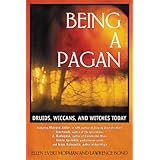 I chose to read/review Being a Pagan: Druids, Wiccans and Witches Today for my second Dedicant Path book review. One of several options listed as fulfilling the Modern Paganism and Pagan Revival category, I looked forward to this work, compiled and completed by Ellen Evert Hopman and Lawrence Bond, as something new since I had read other works in this category many years ago.
I chose to read/review Being a Pagan: Druids, Wiccans and Witches Today for my second Dedicant Path book review. One of several options listed as fulfilling the Modern Paganism and Pagan Revival category, I looked forward to this work, compiled and completed by Ellen Evert Hopman and Lawrence Bond, as something new since I had read other works in this category many years ago. Being a Pagan is, fundamentally, a collection of Q&A sessions completed with individuals considered "movers and shakers" within the pan-pagan community. Divided into seventeen different path-oriented chapters, the interviews each begin with a standard "Are you pagan? When did you decide you were pagan?" opening and then delve into each individual's experiences and practices as a modern pagan. This format allows each interviewee to speak freely on his/her own specialties or, as is sometimes apparent, his/her own soapboxes. Overall, the interviews are easy to follow and most chapters include an introduction that summarizes the uniting theme of interviews contained within. There does not seem to be any discernible chronology or reason for the order of the chapters so at times the reader is being referred to individuals and content found much later in the book.
In my opinion, however, Being a Pagan does not leave the reader with a positive view of modern pagans. As a result of the repetition of certain threads and themes, a mind-numbing reading of all 50 interviews paints a portrait of modern pagans as an elitist, self-legitimizing group of individuals who are constantly at odds. Indeed, several interviewees take shots at each other concerning fundamental issues, such as the roles of gender and sexuality, and whether pagan clergy should be paid for their services.
My biggest issue with the book is actually the apparent contradiction with the word "Today" in the title. Being a Pagan was first published back in 1996 - many of the issues and players highlighted in this work are virtually nonexistent in today's pagan communities. In fact, many of the organizations and resources highlighted near the end of the book no longer exist (and no website information is listed for those that do). All but one of the interviews in the 2002 re-release were completed prior to 1995; this means that nearly 20 years of contemporary pagan voices and issues are not present in this work. This critical oversight means that current topics such as leadership and gender, pagan involvement in interfaith communities and the role of the Internet in modern religion are completely absent. By failing to regularly update the material and focus of the content, the compilers of Being a Pagan have insured that their work has become, at this point in time, one more of an historical review, rather than contemporary scholarship.
What could breath fresh life into this book? I suggest keeping one-third of the most important essays (such as those with Starhawk, Isaac Bonewits, Ian Corrigan and Margot Adler) and adding in an additional fifteen or so new Q&A sessions with high profile modern pagans such as Teo Bishop, Terry Pratchett, Carl Weschcke and Michael J. Dangler. These contemporary voices could speak about pagan issues of the last 15 years, and speculate on what the next 15 years might bring.
No comments:
Post a Comment